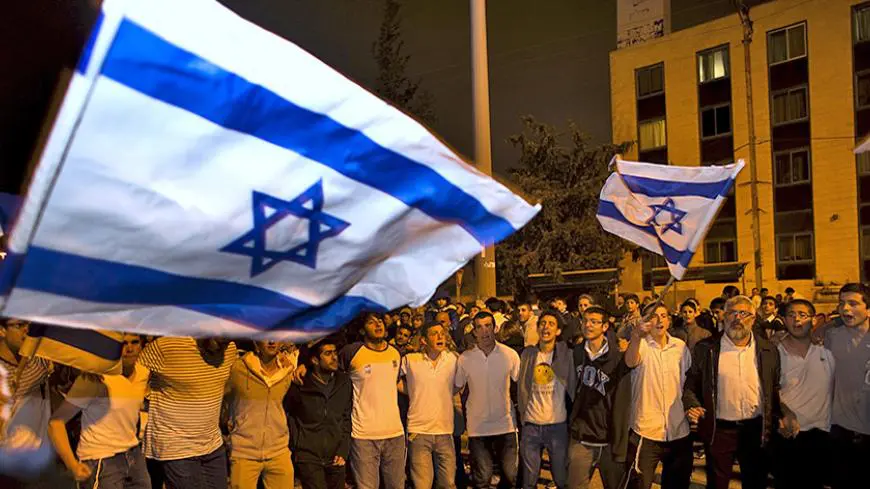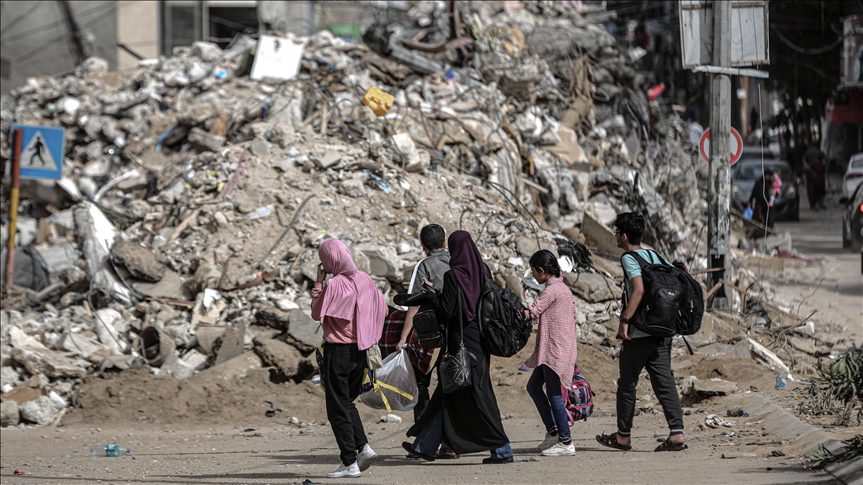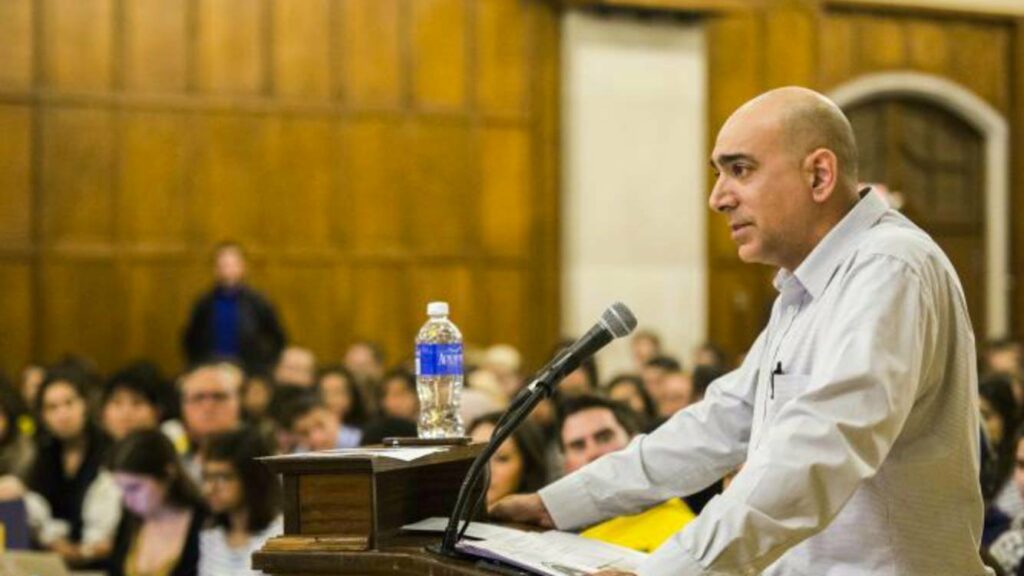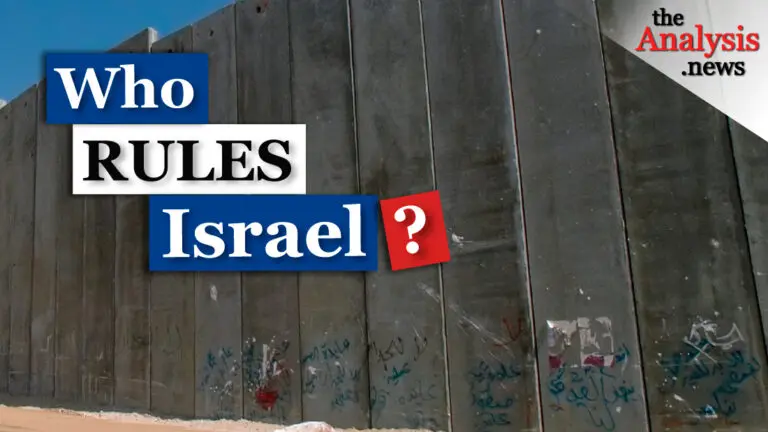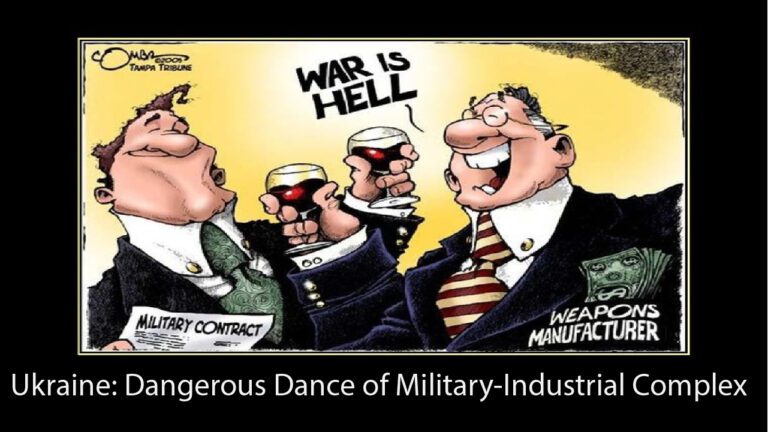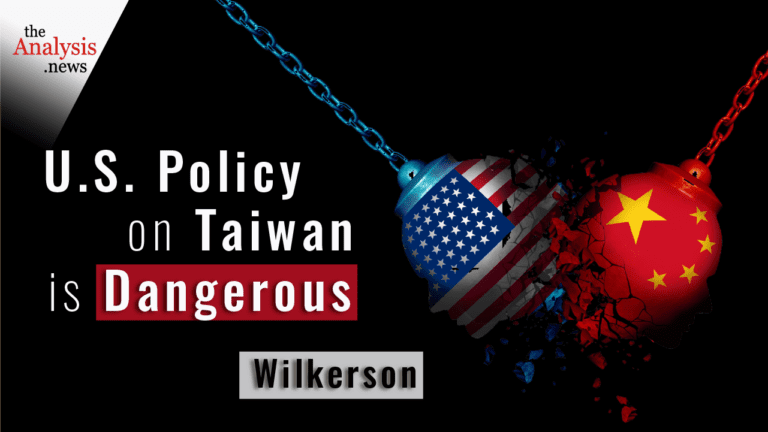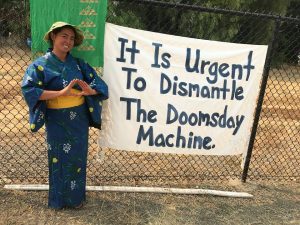On Reality Asserts Itself, Ali Abunimah, founder of Electronic Intifada, says that Palestinians need to know that even in a country with formal legal equality, the reality can mean mass incarceration, economic inequality and racism.
This is an episode of Reality Asserts Itself, produced May 14, 2014.
STORY TRANSCRIPT
PAUL JAY, SENIOR EDITOR, TRNN: Welcome back to The Real News Network and welcome back to Reality Asserts Itself.
We’re continuing our discussion with Ali Abunimah, the founder and codirector of Electronic Intifada, one of the world, I would say, more important sites for news and analysis about Palestine.
Thanks for joining us again.
ALI ABUNIMAH, COFOUNDER, ELECTRONIC INTIFADA: Thank you.
JAY: So, just again, quickly, other than Electronic Intifada, Ali is also the author of The Battle for Justice in Palestine, which is his latest book, and, 2006, One Country: A Bold Proposal to End the Israeli-Palestinian Impasse.
So, in chapter one of the book–I’m going to read a quote–you talk about what Palestinians can learn from the African-American struggle:
While abolishing the racism and violence of Zionism practices against Palestinians is the key to justice and peace in historic Palestine, no less than the abolition of slavery and Jim Crow in the United States were absolutely necessary, recent American history demonstrates that systems of racial control and the ideologies underpinning them remain robust and adaptable. A formally liberal and rights-based order can allow a system just as oppressive as Jim Crow to hide and flourish in plain sight.
One of your themes in the first chapter is what Palestinians can learn from African Americans. And we’re in a city that’s 65 percent African-American, and you’ve lived in Chicago for 20 years, a city with a very large African-American population. So what do you think Palestinians can learn from the African-American struggle?
ABUNIMAH: Well, if I can just give some context to that quote, which I think helps to answer that, you know, as more and more people have recognized that the so-called two-state solution is over, there’s–more and more people are arguing, including myself, for a single democratic state encompassing what is today Israel and the occupied territories.
And often people say, well, you know, we ought to have equal rights as in the United States or as in some other countries, and what I felt that it was necessary to do is to really interrogate that and to say, well, you know, I don’t think we can sincerely or honestly hold the United States up as a model when in fact there is so much systematic racial injustice.
And so what that quote leads into is a discussion of Michelle Alexander’s The New Jim Crow, which was a very important book for me and for many other people, to explain how, you know, equality before the law officially in the United States can coexist with mass incarceration. And that serves as a warning for Palestinians that, you know, even if they achieve, you know, full liberal rights in a single state, they may not get out from under the yoke of racism and oppression and apartheid.
But it also requires us to examine the kind of so-called shared values. And that’s from a chapter in the book called “Shared Values, Shared Struggle”, that, you know, at every occasion, President Obama and all his predecessors will tell us that, oh, the United States and Israel have shared values. And so what are these shared values? And I argue that it includes things like a really racialized view of the world, where Palestinians, in the case of Israel, and African Americans, Latinos, and other people of color in the United States are viewed as some kind of demographic threat that needs to be policed and controlled and surveilled.
And these shared values take a very real form when you see–and I write about this–that the top police brass from almost every major U.S. city and many smaller cities have been taken on junkets to Israel by groups including the American Jewish Committee, the Anti-Defamation League, groups sponsored by AIPAC, the Israel lobby group, and they take them to places like Megiddo Prison, where Palestinians are routinely tortured, including children, held in solitary confinement. And then they come out and they say, oh, the Israelis are so good at, you know, security and in living in a tough neighborhood. And even that language of the tough neighborhood, it comes out of a racialized American discourse. And they say–you know, you see all these quotes from American police chiefs saying, oh, the Israelis are such experts, we’re going to take what we learned back to Chicago, back to L.A., back to Baltimore.
And, in fact, Israel is–its niche now is the so-called homeland security industry, where they’re exporting billions of dollars of, you know, goods, weapons, and services to federal, state, and local police and judicial authorities. So there’s a real kind of convergence of ideology and business interest, where, in a sense, you know, if you’re fighting mass incarceration in the United States or if you’re fighting what Israel is doing to Palestinians, you really need to be part of the same fight, because it’s the same corporations profiting from them and it’s the same politicians who are talking about Israel as a paragon of, you know, human rights and a model for the United States while backing the hypermilitarization of policing, the rail to jail for schoolchildren in the cities, particularly African-American schoolchildren, where we see public education being gutted and privatized and at the same time we see prisons flourishing.
JAY: Now go back to your point about formal rights and legal rights and the substance of rights. But certainly the formal rights are better than no formal rights. Certainly the supposed equality under the law, which–we know the substance of that is not only for blacks; for poor whites too there’s no equality under the law–but it’s certainly better than slavery.
ABUNIMAH: It’s–what I say, of course, is that it’s an absolutely necessary step to abolish formal discrimination and Jim Crow, and the same in Palestine. But what I’m saying is it’s insufficient. It’s necessary but insufficient. You can’t just declare everyone equal and then move on, because that’s not–you know, the injustice–.
JAY: And you can see that [incompr.] clearly in South Africa, where they declared everyone equal, but now you have–in fact, in terms of the actual living–quality of living and quality–availability of water and other things, people are saying, is actually worse now than it was under apartheid.
ABUNIMAH: That’s right, and that’s another example I discuss in the book, where I think a lesson for Palestinians is that economic justice and economic democracy, restitution, redistribution, have to be really front and center and not just left (as they have been, both in the case of civil rights in the United States and ending apartheid in South Africa) as an afterthought, as something that will–you know, it’ll take care of itself in due course, because the reality is it hasn’t. And we can’t afford to repeat that.
JAY: Now, in terms of learning from the African-American struggle, I mean, one of the things that tipped the balance in terms of equality of rights under the law was the civil rights movement in the 1960s, which certainly had some gains of actually implementing what supposedly had happened previously, you know, in terms of getting on a bus and in terms of a Fair Housing Act, an increase in these level of formal rights, which certainly has made life better. I mean, it doesn’t change any of the substantial fact of the chronic poor and [incompr.] African-American and who’s in prison and so on, but still there were some gains. That mass civil rights movement we haven’t really seen–we’ve seen attempts at it amongst the Palestinians, but we haven’t seen anything at that level. Like, I’ve always wondered why there wasn’t this, like, million-Palestinian march coming from the West Bank to the separation wall and hundreds of thousands of Arab-Israeli citizens marching to this side; and that level of mass civil disobedience and civil protest we haven’t seen. And why? ‘Cause it’s certainly–I agree it wasn’t the full answer to the story, but it did create and cause some change here.
ABUNIMAH: Well, you know, I’m not sure we haven’t seen it. I think we’ve seen it in different forms and we’ve seen sustained Palestinian resistance and protest. We just recently passed Land Day, which is commemorated every March 30, which commemorates the mass marches of Palestinians in Israel in 1976 against the systematic confiscation of their land for Jewish settlement. And Israel met those marches and strikes in 1976 with lethal violence, killing six people. And that experience was repeated in 2000 when Palestinian citizens of Israel marched en masse in October 2000 and the Israeli police opened fire on them with live ammunition, killing many of them, something that they never do with Israeli-Jewish citizens.
And, of course, the physical separation, which is a very deliberate Israeli strategy, and the reduction of Palestinians to just fighting for survival is part of a strategy designed to prevent Palestinians from being able to organize, being able to meet. Before we were recording, we were talking about a Palestinian marathoner who’s been denied by Israel permission to go from Gaza to the West Bank to compete. And so if you can’t even travel, how can you organize?
At the same time, Palestinians are finding ways to organize. I mean, even in Israeli prisons, Palestinians have gone on mass hunger strikes. And, of course, Palestinians are going out protesting every week against the confiscation of land. So this goes on.
But I think that in a sense the way Palestinians have found now to in a sense catalyze not just a Palestinian movement but a global movement to mobilize people is through boycott, divestment, and sanctions.
But I want to say something. You referred to the Fair Housing Act. I use that specific example in the book to talk about how, you know, even something like the Fair Housing Act is unimaginable in Israel today. And in fact there’s even legislation going in the opposite direction. And I think it’s making it legal to discriminate against people for not being Jewish, for example.
JAY: Yeah, can I just quickly give a Baltimore example, just for people who are watching?
ABUNIMAH: Yeah.
JAY: It used to be legal–I forget the actual year. I think it was the 1940s where it was made illegal. But if you had a subdivision, a new subdivision just outside the city or a suburb in Baltimore, you actually had to sign an agreement in your deed which said that you could not sell your house to blacks–or Jews, for that matter, but particularly targeted with African Americans. Later, it was formally made illegal and then informally was still in force: if you actually tried to sell your house, you could be–there would be repercussions in terms of the people that own the subdivision; and later they used blockbusting to play this. But as late as 1969 in Baltimore, there was–I’m told there–in The Baltimore Sun, there was a section of real estate classifieds for whites, a section for Jews (a separate section), and no section for blacks.
ABUNIMAH: Well, and that was true in Chicago and that was true all over the country. And it’s important to–and that was true in Canada, by the way. And, you know, it’s important not to lay all this history on the South and to forget how entrenched and systematic and formal this segregation and racism was throughout the United States. And the legacy of that is that cities like Chicago are still the most segregated in the world in terms of the ongoing effects of that.
But that kind of segregation, which we view today as a negative result of racism that we now repudiate, is actually the goal that Israeli policymakers are working towards with many of the laws. There’s a statement from the Israeli Housing minister a few years ago, Ariel Atias, who says that, you know, we have populations mixing who shouldn’t be mixing and we have to keep them apart, and so Israel actually pushing policies designed at promoting ethnoracial, ethnoreligious segregation.
But this doesn’t stop, you know, President Obama from, you know, these heartfelt declarations of the values he shares with Israel. And I find that to be a particularly tragic and cruel irony, given that his own election victory is seen as being, you know, one of the fruits of the sacrifices so many people made in the civil rights struggle, that, you know, someone like him, whose election was unimaginable, you know, even a decade ago, is today promoting a country like Israel, whose racism against Palestinians, against Africans, against others is so systematic.
JAY: What are some other examples on the housing side in Israel of where there isn’t this equal citizenship?
ABUNIMAH: Well, you know, it’s–I mean, it’s on so many levels. I mean, it’s on the micro level, where you have Jewish and non-Jewish citizens in present-day Israel, where Palestinian citizens of Israel have actually had to go to court for the right to live in Jewish neighborhoods. But it’s also on the macro level. I mean, what is Gaza? Gaza is really an open-air prison where 1.7 million people live. Eighty percent of them are refugees from areas that are now part of Israel. And the only reason they have to live in a fenced open-air prison in Gaza and can’t go back to their lands–most of which are empty, by the way, in what’s now southern Israel–the only reason they can’t go back is because they’re not Jewish. If they were Jewish, Israel would tear down the fences and say, come on home. So it’s the micro level, where you have hundreds of Israeli rabbis, municipal rabbis whose salaries are paid for by the state, who’ve issued these public calls saying it’s forbidden to rent to Arabs–you know, if you own an apartment, don’t rent it to an Arab–and at the same time this macro level segregation. It’s almost like, to use a South Africa analogy, the petty apartheid and the grand apartheid.
And, by the way, the reason these rabbis have been issuing these calls in recent years is because Israel has not allowed even the Palestinian population who are citizens of Israel to build a single new town in 65 years, has taken most of their land. So what are they trying to do? They’re trying to get houses in areas where the houses are being built, which is in Jewish areas, and then they’re being met with these kinds of decrees.
JAY: Okay. We’re going to continue our series of interviews on Reality Asserts Itself on The Real News with Ali Abunimah. Please join us.

